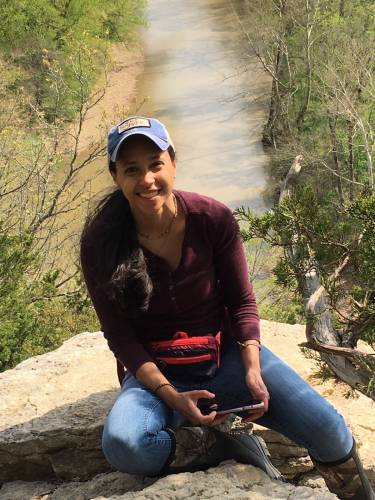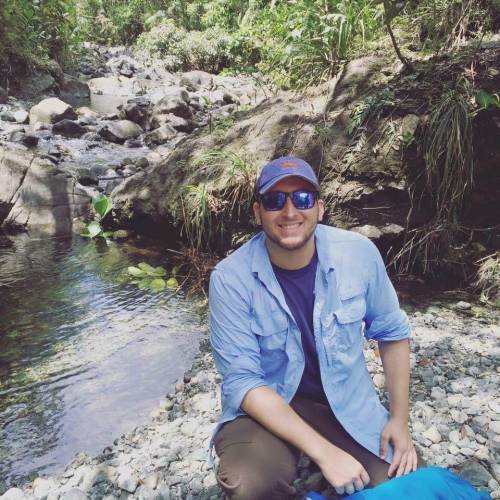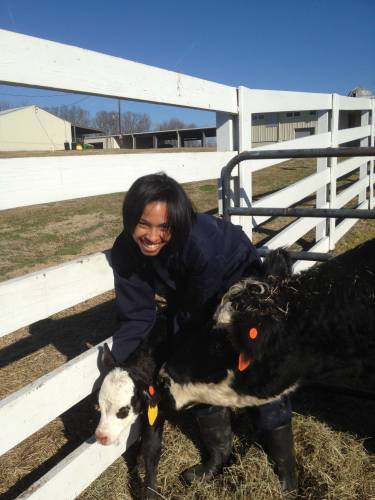The University of Missouri College of Agriculture, Food and Natural Resources (CAFNR) School of Natural Resources (SNR) offers a premier PhD program in forest resources. The new program, supported by SNR and the National Institute of Food and Agriculture (NIFA) Food and Agricultural Sciences National Needs Graduate Fellowships (NNF) Grants Program, offers students an opportunity to pursue interdisciplinary studies focused in areas such as agroforestry, forest management, silviculture, landscape ecology, fire science, urban ecology, water resources, or natural resources law and policy.
The goal of the fellowship is to prepare students for a wide range of careers, inclusive of academic institutions, consulting firms, industry, and state and federal agencies through coursework, research, internships and personalized mentorship. To be eligible for the fellowship, applicants must be a U.S. citizen and a member of a racial/ethnic group underrepresented in forest resources.
Three students are funded through the fellowship – Andria Caruthers, Angel Colon-Santiago and Kendra Esparza-Harris.
“The scope of the forestry profession has broadened from a traditional focus on timber management to include aspects of conservation science, landscape ecology, ecosystem services, urban ecology and human dimensions, while retaining the critical foundation in applied forest science,” said Charles Nilon, William J. Rucker Professor in Fisheries and Wildlife, and program director. “There is a growing need to address the factors that have left some populations underrepresented in the field and remove barriers to individuals studying at the graduate level, which is a priority for the MU School of Natural Resources.”
The program is administered by Nilon; Ben Knapp, associate professor of silviculture in SNR; Robin Rotman, assistant professor in SNR; and Lindsey Saunders, projects manager with CAFNR International Programs.
Andria Caruthers: Educating Landowners on Sustainable Agroforestry Strategies
Andria Caruthers developed an interest in agroforestry’s role in rural development through her work at the MU School of Journalism’s Health Communication Research Center where she worked on state and federally funded grant projects that sought to improve social and economic vitality of Missouri’s rural communities. As she looking to further her education with a PhD in a natural resources-related field, the School of Natural Resources made the most sense.
Caruthers earned her bachelor’s degree in communication from Columbia College before receiving dual master’s degrees in public health and journalism from MU.

“I entered the program with the goal of gaining the knowledge and skills to educate landowners on sustainable, multifunctional land management strategies,” Caruthers said. “My research interests include exploring the social-ecological drivers behind land management decisions in an effort to understand land owner’s decision-making processes and make sustainable practices more accessible to landowners. I’m passionate about the area I’m in – agroforestry – and the topics I get to explore. It means a lot to be able to spend my time contributing to a subject I’m passionate about.”
The Grow Well Missouri program, that Caruthers was a part of during her master’s work at MU, gave her the opportunity to work with rural food pantries throughout Missouri. She helped establish food gardening programs by providing seed, vegetable transplants, educational materials and one-on-one advice to people who use the food pantries.
“Additionally, we worked with communities on adopting transportation policies in an effort to promote infrastructure that supports multiple modes of transportation and opportunities for recreation via trails and parks,” she said. “These transportation policies and collaborative partnerships are attractive to potential project funders and businesses that are considering areas to invest in as it is usually part of a larger, long-term strategic plan that shows communities have a vision outlined for their future.”
Caruthers is currently working on a paper related to how agroforestry can contribute to regional/local food and nutritional security by providing local, sustainably-grown, nutrient-dense food crops. This is even more important as the COVID-19 pandemic slowed the food supply chain.
“We saw some failures in our food supply chain with meat processing facilities shut down, meat prices increasing and stores running out of certain food items,” Caruthers said. “So it’s about creating more regional/local food supply chains. This is important as we deal with more uncertainties in the future. We need to make our communities resilient in the face of uncertainties, and food and nutritional security should be a top priority. Agroforestry systems can be designed to optimize dietary diversity and highly nutritious foods like walnuts, pecans, Chinese chestnuts and elderberries can be grown locally.
“It also provides economic opportunity for rural areas to grow and sell value-added food products and have more influence in the market in terms of pricing and marketing strategies. The challenge being there is not a clear market for some of these crops, so research focusing on agroforestry adoption barriers is important as well. It’s about making our communities more resilient to uncertainties and meeting the food demands of a growing population without sacrificing biodiversity and natural resources and the services they provide us.”
Caruthers is being advised by Sarah Lovell, H.E. Garrett Endowed Chair Professor in SNR and director of the Center for Agroforestry, and Robin Rotman, assistant professor in SNR. Caruthers said she is focused on helping smallholders, or individuals who operate an agricultural holding smaller than a farm. She wants to help them implement productive and profitable agroforestry practices, especially the younger generation. The fellowship is helping Caruthers reach her goal.
“I think a fellowship of this nature is very important, and I’m very grateful to Dr. Nilon for letting me know about this opportunity,” Caruthers said. “A lot of the issues we’re dealing with now like water quality and climate change affect all of us, so I think extending opportunities in natural resources is very important to give everyone a voice. It also allows people in communities that are not usually represented to voice the problems and come up with solutions to issues that impact their communities.”
Angel Colon-Santiago: Biogeochemical Cycles and Water Quality
Master’s research in Puerto Rico on stream ecology led Angel Colon-Santiago to pursue doctoral programs that offered interdisciplinary experience in freshwater resources and forestry. He found a perfect program in the School of Natural Resources at the University of Missouri.
Colon-Santiago is working with his advisor Alba Argerich, assistant professor in SNR, in the Limnology Lab.

“With my master’s degree, I conducted research on stream ecology and discovered that freshwaters are considered a top priority ecological issue now and for the future,” Colon-Santiago said. “Hence, I started looking for doctoral programs that offered interdisciplinary experiences in freshwater resources and forestry, and I found Mizzou’s PhD program in Natural Resources. I contacted the Limnology Lab and did an interview with Dr. Argerich, who’s now my advisor. In the interview, Dr. Argerich told me about her research and the opportunities available at Mizzou, and I felt that I had found the right place for me.”
Colon-Santiago received his bachelor’s degree in biology from the Inter American University of Puerto Rico and his master’s degree in business administration from the University of Saint Francis in Indiana. He also received a master’s degree in biology from the University of Puerto Rico. Colon-Santiago served as a fish and wildlife biologist for six years with the U.S. Fish and Wildlife Service in Boquerón, Puerto Rico.
His research interests include learning more about the biogeochemical cycle of carbon and nitrogen in streams.
“I will be working on the interaction of forested, riparian and freshwater ecosystems,” Colon-Santiago said. “We’ll be looking at how the carbon and nitrogen are transported through these ecosystems, how are they transformed into their different forms and quantifying them through different seasons of the year. This research can help us better understand how seasonal variations affect biogeochemical cycles and water quality. Also, it can help us understand what could happen to these cycles as climate change alters the season’s weather and duration. I did not know about this research topic until I talked to Dr. Argerich in my first interview. She told me about this topic and its scientific value and I felt very interested. Since then, we have been working on developing a plan to start conducting the research very soon.”
He said a fellowship of this nature is exciting, as it opens the door for Latinos to establish themselves as scientists.
“I believe that having fellowships that offer opportunities to underrepresented groups in any discipline is very important,” Colon-Santiago said. “These fellowships help young scientists to establish a career that will serve as a role model for others. In general, Latinos are underrepresented in almost every scientific discipline, despite being the second-largest ethnic group in the United States. Add to that, that as a Puerto Rican, even though we are U.S. citizens and part of the U.S., we have to overcome language and geographical barriers to be successful scientists. Hence, these fellowships help to close the gap of underrepresentation for Latinos and Puerto Ricans in the sciences.”
Colon-Santiago said after completing the fellowship with SNR, he is hoping to join the federal government as a scientist.
“Well, at first I couldn’t believe that I was selected for a fellowship supported by the National Institute of Food and Agriculture (NIFA), since they are very competitive,” Colon-Santiago said. “Then I was very happy and excited because this fellowship provides full funding and also offers unique opportunities such as teaching experience and professional internships with governmental agencies and policymakers. Also, it matches the fellows with external advisors that can help their career, which for me is very important because I want to focus my career in research for policymaking. I’m very happy and excited to be here at Mizzou because there are many opportunities to develop research skills and conduct work in places like the Baskett Research Center.”
Kendra Esparza-Harris: Mitigating Human and Wildlife Interactions
As an agroforestry extension specialist in Senegal, West Africa, with the Peace Corps for nearly two years, Kendra Esparza-Harris saw firsthand the impact of agroforestry practices on human-wildlife interactions and wildlife conservation. It was an experience that showcased the importance of agroforestry practices on improving complex relationships that impact sustainable species populations, while also supporting human agriculture needs and economic growth.
Esparza-Harris received her undergraduate degree in animal science from North Carolina Agricultural and Technical State University. She received her master’s degree in animal science from the University of Illinois at Urbana-Champaign. Following her master’s studies, she interned with the St. Louis Zoo in the departments of reproduction, endocrinology and contraception.
“Before arriving in Senegal, my field work involved agricultural and wildlife assisted reproductive technologies with a passion for the future reintroduction of species to their respective habitats,” Esparza-Harris said. “This passion took me to Africa as an agroforestry specialist where agricultural land clearing, brush fires, deforestation and human perceptions on co-existence negatively impact effective land use management and wildlife conservation.”

After returning to the United States from Senegal, she was searching for an agroforestry PhD program.
“I wanted to pursue a graduate program that focused specifically in the area of agroforestry and would allow me to research the potential that agroforestry practices have towards the mitigation of human-wildlife interactions,” Esparza-Harris said. “The Center for Agroforestry at Mizzou allows a focused area of study in agroforestry, which is incredibly unique. The School of Natural Resources program in human dimensions of natural resources and wildlife conservation is a bonus as it aligns with my interdisciplinary research goals as well.
“In the fields of natural resources and agriculture, we are seeking innovative ideas and sustainable concepts that will maintain and provide economic opportunities, increase food security and ensure biodiversity within ecosystems, especially within urban areas and developing countries. All of this cannot be done without multicultural ideas and ethics, especially in land management and conservations, and fellowships such as the NNF that facilitates an increase in doctoral studies of underrepresented students.”
After her time with the Peace Corps, Esparza-Harris earned a fellowship at the Cincinnati Zoo as the Lindner Center for Conservation and Research of Endangered Wildlife’s (CREW) Charlotte R. Schmidlapp Scholar. That program gives young female scientists, who are interested in wildlife conservation, an opportunity to receive hands-on training during a five-month course at CREW.
Her research at the Cincinnati Zoo is focused on investigating a novel approach to sorting domestic cat sperm by sex as a model for endangered wild cats. The hope is that by incorporating this novel approach into CREW’s artificial insemination procedures with wild cats, they may be able to preselect offspring gender for better management of their field populations.
“Immediately upon receiving the notification that I was awarded the NIFA fellowship, the possibilities of applied research studies and collaborations rushed into my head,” Esparza-Harris said. “In searching for a PhD program, it is difficult to find a program that suits your research interests, especially when they are interdisciplinary, as most programs are focused in a specific area; however, the NIFA fellowship at Mizzou provides me with the opportunity to explore the depths that my research can reach. Words cannot explain the excitement I have to jump into my PhD work at MU, which feels like a perfect fit.”
Esparza-Harris will be advised Ashley Conway, assistant research professor with the Center for Agroforestry, and Lovell.
Esparza-Harris said research is focused on the use of agroforestry practices, specifically silvopasture and its interaction within human and wildlife interactions.
“Overall, my research focus encompasses specifically looking at ways to mitigate human and wildlife interactions through sustainable land use and management that will promote protection and restoration of wildlife habitats,” she said. “My interests in the subject matter have evolved throughout my years of study, research and technical experience. With a background in applied reproduction, and seeing the factors that inhibit sustainable species populations and reproduction guided me to focus on human and wildlife interactions.
“Following completion of my PhD program, I strive to work alongside an agency and focus in mitigating domestic and international human and wildlife interactions, specifically with carnivores.”